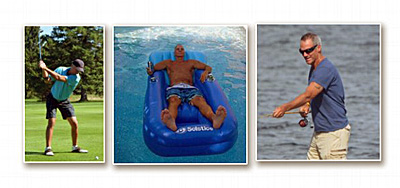After completing a full calendar year of retirement, I’ve come to appreciate the similarities between a corporate management position and the post-work life of leisure – at least when it comes to planning, execution, and the evaluation of accomplishments.
In business, the beginning of a new year was always an invigorating time of renewal and optimism. An opportunity to look back on the successes and shortcomings of the year past, and a chance to rejig the plan to make the best of the new year ahead. It was a fresh opportunity to reaffirm, or in some cases recover, a successful record.
I suspect a results-focused mentality in retirement is to be expected after a long career of leading business teams towards annual performance targets. January always provided a fleeting opportunity to bask in the success of the prior year, or in the event of a disappointing one, a shot at redemption. Either way, the corporate measurement of achievement is generally answered by the question: what have you done for me lately? A new year brought new production, profitability, and service targets – and a new set of expectations.
***
 In the business world, organizations are guided by proprietary doctrines commonly known as:
In the business world, organizations are guided by proprietary doctrines commonly known as:
- The Corporate Vision
- The Mission Statement
- The Business Plan
The proclamations of corporate philosophy and comportment are usually published and enthusiastically promoted for the purpose of solidifying the brand and rallying the employee population to a formidable force of common purpose.
But these vehicles of motivation need not be limited to employment circles. I’ve discovered that a savvy retiree can also make the best of the year ahead with a personalized variation of these governing dictums. Granted, they may not be as detailed or as diligently enforced as those in the business world, and it’s true they may not even be written down. But with a little planning, the post-work population can enhance leisurely lifestyles by organizing aspirations, setting clear goals, and periodically evaluating progress.
The Personal Vision
The Corporate Vision generally seeks to articulate in a short declaration, what employees, customers, and suppliers can expect the enterprise to become or achieve.
A similar guiding principle can be equally effective in the post-work period. The Personal Vision achieves much the same but is intended more as a reminder to self and an invitation to potential companions of similar interest and comparable opportunity. After several decades of marching to the beat of the corporate drum, a new retiree could perhaps be forgiven for adopting a vision that tilted slightly in favour of self-indulgence. If it were written out, an example of a Personal Vision for a retiree may look something like this:
To participate in a loosely scheduled series of creative, recreational, and educational pursuits generating minimal stress and maximum satisfaction. To maintain a healthy diet and active exercise program in the interest of good health, sound sleep, and overall personal well-being.
The Personal Mission Statement
Employers endeavor to promote a definitive corporate culture with employees and customers by developing Mission Statements. The purpose of the Mission Statement is to articulate what the company stands for and summarize its core goals and purpose.
An example from a firm whose wares I’ve become increasingly familiar with:
Google’s mission is to organize the world’s information and make it universally accessible and useful.
The concept is readily adaptable to the personal circumstances of the leisurely. A Personal Mission Statement may be as brief or detailed as the author chooses. The recent and interminable hit song by Meghan Trainor simply asserted:
I’m all about that bass, ’bout that bass, no treble.
A more extensive Personal Mission Statement suitable for a retiree might read:
Derrick’s mission is to savour each day; to engage in recreational activities and pursuits of personal passion neglected in the working years; to continually learn and develop skills; to spend quality time and share rich experiences with family and friends.
***
The Personal Business Plan
The heart of an organization’s effectiveness and business success is ultimately found in the annual Business Plan. It is here that detailed initiatives are meticulously documented and assigned strict timelines. The plan will have subsets focusing on specific elements such as: financial budget; marketing; operations; employee development; and competitor analysis.
The Business Plan is entirely consistent with the Vision and Mission statements and becomes the blueprint for the year’s actions and activities. Development of an effective and achievable business plan (i.e. avoids soul-destroying stretch target extremes) provides the best chance for an organization to successfully meet its objectives.
Much of the same planning logic pertains to the retiree. A look back to review accomplishments of the past year is a precursor to preparing a realistic and achievable plan for the next. While the substance of activities will be slightly different, there are many similarities between The Business Plan and The Personal Business Plan.
 For example, upon review of personal performance for the 2014 calendar year, I immediately recognize successes and shortfalls. At 65 completed rounds, golf frequency adequately met expectations. Blog posts were on track with a better than bi-weekly average, a couple of pieces were published in The Globe and The London Freepress.
For example, upon review of personal performance for the 2014 calendar year, I immediately recognize successes and shortfalls. At 65 completed rounds, golf frequency adequately met expectations. Blog posts were on track with a better than bi-weekly average, a couple of pieces were published in The Globe and The London Freepress.
I read most of the books I wanted to, kept relatively fit, improved the diet, shaved every few days, expanded my cooking skills beyond the barbecue, reunited with several longtime friends, vacationed in Grand Cayman, Whitehorse, Muskoka, Scotland, and Northern Ireland, stayed mostly within budget, logged sufficient backyard pool days, and closed the year by viewing the complete 64 episode series of Breaking Bad in less than a week.
On the downside, I didn’t spend enough time practicing guitar or honing skills on the basement pool table, I would have preferred to reduce the golf handicap by a few more strokes, and I never completed the 10K run I had planned. With the advantage of self-appraisal (and some insightful input from my better half and retirement sponsor), on balance, it was a year fully worthy of a Meets Expectations performance rating.
The beauty of a new year and fresh Personal Business Plan – just like in business – is that adjustments can be incorporated for the year ahead. Some of my core plans for 2015 include: two weeks vacation with good friends in Palm Springs, California; the shameless spoiling of a first grandchild; entertaining family visitors from Scotland; completing the first draft of a novel; spending quality time with people I like; losing a few pounds; and paring down the golf handicap. But I fully expect there to be some modifications, on the fly.
***
Looking back on the highlights of the past year and considering the prospects for the year ahead, I can’t help but think there is overwhelming advantage found in the post-work application of this process.
Whether a corporate management position or post-work life of leisure, the best use of time ultimately comes through good planning, effective execution, and fair evaluation of performance – but in the case of the retiree, it’s refreshingly manageable, entirely flexible, and delightfully self-directed.
*****



Leave a Reply